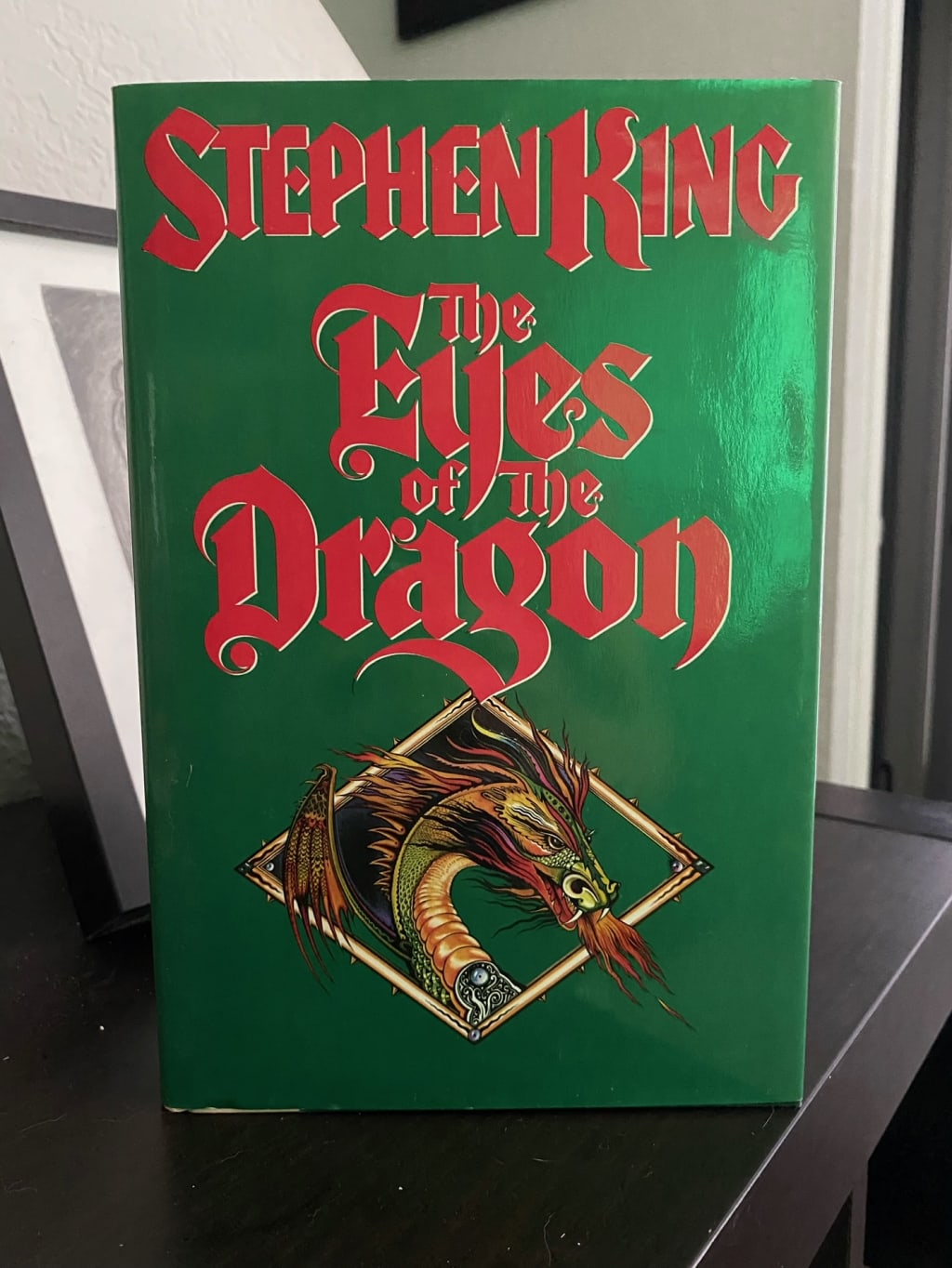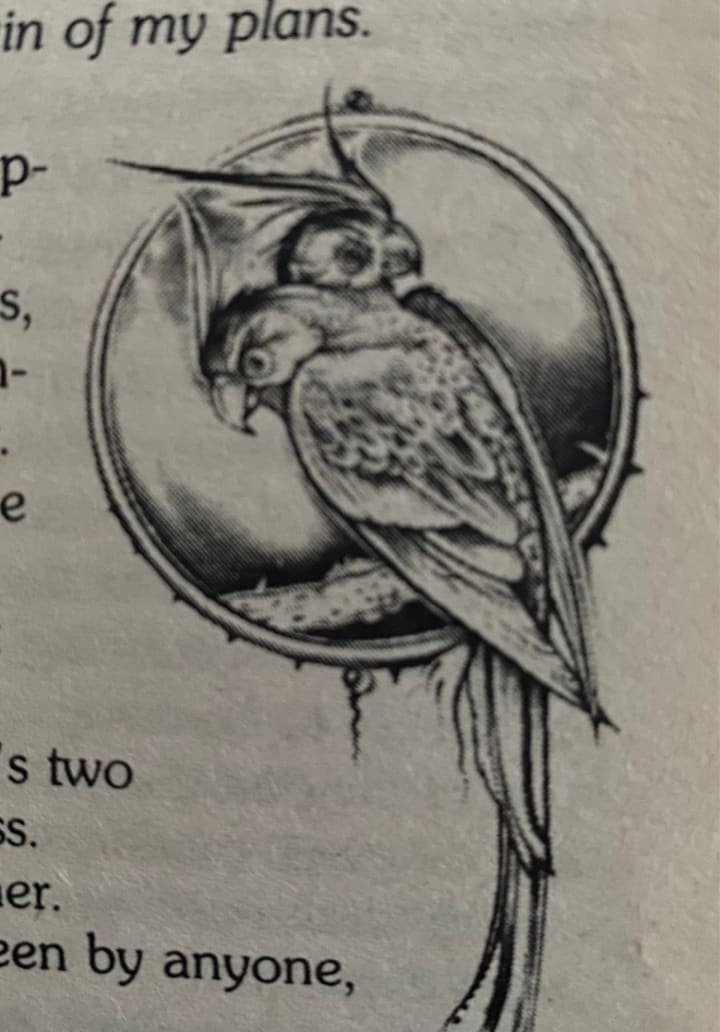Does A Dog Use His Napkin?
A book report 25 years in the making

"Lives may not depend on whether or not you use your napkin after the roast chicken...but they may. They may. Lives have depended on less, at times." -- Queen Sasha
Stephen King explores the vastness of humanity and peels back the skin of reality to reveal the fetid stink beneath our very cultivated and curated exteriors. So it might surprise you to know he wrote a young adult novel, and it wasn't a horror novel.
I was instantly attracted to the cover, as you may very well be. David Palladini's work in Tarot illustrations is exemplified in the brilliant design of the original hardback and the gorgeously wrought illustrations throughout the book. I was 13 or 14. The book's spine was a green gash in the stacks of my school library.
Since I had whet my appetite for King on IT, his YA novel didn't challenge me in the slightest. I had no trouble with the setting despite never having read Fantasy in any seriousness before. But it wasn't what you'd call a "Fantasy", not really. It was a fairy tale, only there were no fairies, no guardian angels, no strong and swarthy protector, and no princesses. But there were dragons, and immortal villains, and good, and evil, and legendary heroes, and darkness, and bravery.
And there in my eighth grade history class, reading when I should have been working, I set my feet on the cobbled road to Delain. I sank my heart into the well under the sinister basement of a mad magician, and made myself a place between the castle stones to dwell ever after.
There's a lot to unpack from this short novel. It was my first introduction to Flagg, who I would learn much later in life walked every single line between IT, The Stand, and The Dark Tower series. It was my introduction to GrimDark, as it contains more of those elements than the horror King is most known for. It was the first novel I had ever read that gave the devil his due, and taught me to value the voice of the monster. But how did any of that change me?
In truth, none those things did. I'd loved the voices of clever monsters for years, and I was reading at High School Senior level. The novel didn't alter my being in the final acts or shape my core in the highest and lowest moments of the plot, though it's influence on my writing is palpable.
But the novel changed the entire course of my life, and the change took place in the first 24 pages of the novel.
The Difference Between "GOD" and "DOG"
In the very beginning of the novel, Queen Sasha sits tiny Peter down after dinner for a very important lesson. You see at dinner, Peter forgot to use his napkin after he was finished with his roast chicken. He wiped his hands on his doublet like his father and the other nobles of King Roland's court.
Fellow fans of King, do you begin to see a naming pattern emerging here?
But this is no simple lesson in etiquette. Sasha is well-bred, kind, intelligent, astute, and shrewd. In watching the degeneracy of Roland's court, and knowing her husband to be impressionable, she begins preparing her young son for the monarchy at bed time.
She takes up little Peter's slate and writes GOD across it's smooth surface. She then invites the little boy to write the word backwards. He spells DOG beneath her "neat print". She explains to the little boy that one day he will be king and that kings grow to be big, bigger than anyone can see. They grow so big they can crush people just by turning around.
"Bad kings do such things often. I think good kings cannot avoid doing them sometimes."
She goes on to explain what dog-like individuals do, and in doing so, described to my young mind the difference between those who are purely evil, and the evil of blind obedience.
"Our Preachers say that our natures are partly of God and partly of Old Man Splitfoot. Do you know who Old Man Splitfoot is, Peter?"
"He is the devil."
"Yes. But there are few Devils outside of made up stories, Pete--most bad people are more like dogs than devils. Dogs are friendly but stupid, and that's the way most men and women are when they're drunk. When dogs are excited and confused, they may bite. When men and women are excited and confused they may fight. Dogs are great pets because they are loyal, but if a pet is all a man is, then he is a bad man, I think. Dogs can be brave, but they can also be cowards that will howl in the dark or run away with their tale between their legs. A dog is just as eager to lick the hand of a bad master as he is to lick the hand of a good one, because dogs don't know the difference between good and bad. A dog will eat slops, vomit up the part it's stomach can't stand, and come back for more."
I don't actually think King's character is painting a crappy picture of dogs, but rather Sasha is using generalizations of their nature to form a parable of the dangers of blind obedience, to remind her son that just because everyone around him is doing something, that doesn't make what they are doing right, or just, or decent, and just because the monarch does it, it doesn't mean everyone can or should follow them. It's a much more sophisticated version of, "If your friends ran off a cliff, would you do the same?" which we are fond of asking kids when they find they've given in to peer pressure.
Once Sasha has ascertained her son understands the lesson, she follows up with a question that I, like tiny Peter, didn't fully understand until adulthood.
"Does a dog use his napkin?"
The question brings their conversation back around to why Peter felt like he didn't have to use his napkin at the banquet. Because his father didn't use his, that must mean it's okay for Peter to ignore the napkin as well. The behavior is very dog-like, according to Sasha's parable. A dog literally cannot use a napkin, and a dog figuratively does not use his napkin if the people around him do not. Sasha adjures her little boy to always be a good person, a "Godly" person.
As Peter, and his soon-to-be-born brother Thomas, grow up, it will become clear which prince is the "Godly" one and which is the "Dogly" one. This poetic conceit is carried through the rest of the novel, a credit to King's genius.
Childhood Words To Shape The Course Of Adult Actions
As a child, I didn't oppose authority as a rule, but it didn't take but eight or nine years for my parents to realize I was not the daughter they expected to have in their pair of twins.
I was always asked to get in line, to act like "a lady", to be quiet, to take up little space, to "be more like my sister". In fact, so much pressure was put on me to conform that opposition to authority figures eventually built into a usual progression of teenaged rebellion followed by a lifetime of falling short in the eyes of people who would pretend they know better than me.
Sitting in my eighth grade history class, imagining the words "GOD" and "DOG" juxtaposed one above the other on a little boy's slate, the character of Sasha--despite everything this world could try and still tries to do--dispelled my self doubt as surely as Flagg could dispel the shadows with a bit of fire from his fingertips. I was not broken. There was nothing wrong with me. It could be that I was "Godly" in my own way. In teaching her son, Sasha helped me understand that I was moving in the right direction.
Beware Of "Dogs"
The parable is still relevant, and is perhaps more relevant now than it ever has been in my living memory. As our political and social worlds boil around us, certain members of our society have been called upon to exemplify the "dog" in all of us. The media provides us a daily running commentary on the actions of "Bad Men", but our access to social media has given a forum to the "dogliest" among us who have been prone to fighting when excited and confused, behavior that arguably culminated in the January 6th insurrection.
Scroll through TikTok and count the number of videos you'll see of "Karens" shouting at people who are their social, political, and economic peers to "go back where they came from," conjuring the white-forward language of our political leadership that has written a blank check for white supremacy and the abolition of equal rights and bodily autonomy among their primary constituents.
If the former President and the most recent coverage of his indictment has taught us anything, it's that--just like some species of dogs--it might be possible to train people to be aggressive, causing those people to become unpredictable and dangerous. It is possible to teach some people to lick the hand of a bad master by confusing and obfuscating the true source of their pain.
I remember most poignantly the words my father used to guide us away from peer pressure, "Be a leader, not a follower."
I remember them as I write this knowing that he never meant for us to apply those words to figures of authority, to those we should worship as "gods" from our place in the world as "dogs".
In what I believe is his only novel intended for young adults, King warns us that we should always become the kinds of people that "Bad Men" fear, the "Godly" kind, regardless of the consequences. "Godly" people have often stood up to raise their voices, only to receive bullets, imprisonment, or public censure. We must strive to be these "Godly" people anyway, or else run the risk of becoming the "dogs" that Bad Men need us to be.

About the Creator
Ashley McGee
Austin, TX | GrimDark, Fantasy, Horror, Western, and nonfiction | Amazon affiliate and Vocal Ambassador | Tips and hearts appreciated! | Want to see more from me? Consider dropping me a pledge! | RIP Jason David Frank!
Enjoyed the story? Support the Creator.
Subscribe for free to receive all their stories in your feed. You could also pledge your support or give them a one-off tip, letting them know you appreciate their work.






Comments (4)
I had never heard of this King book, but this was a fascinating read with a lot to unpack and think about. Also - I really enjoy your writing style, even for this "book report" your language was colorful and interesting!
I never knew he wrote a YA book! I will probably check it out at some point. Your commentary on it is insightful 😁
Ive never heard of this book, but I want to read it now. Or perhaps I want my kids to read it now, too.
I love this book. I also read it when I was 14. I love your thoughts on it. I wish I still had my first edition copy. At one time they where really valuable. Not sure if they still are.